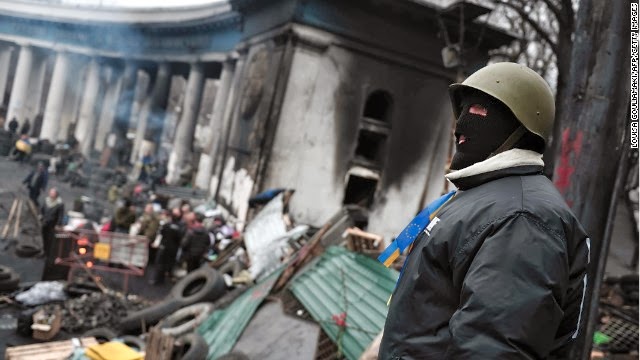Kiev, Ukraine (CNN) -- A riot police force used
against anti-government protesters in Ukraine has been disbanded, the
country's acting Interior Minister Arsen Avakov said Wednesday.
Demonstrators accused the
elite Berkut force, deployed by the government of ousted President
Viktor Yanukovych to quell recent protests, of using excessive force.
Avakov said on his Facebook page that he'd signed the order disbanding the force Tuesday.
But the new, pro-Russian
mayor of Sevastopol, in Ukraine's Crimean Peninsula, claimed Tuesday
night that he had secured funding to keep paying elite Berkut riot
police in his city even after they were disbanded.
The mayor, Alexej Chaliy,
made the comments at a rally in Sevastopol. The interim authorities in
Kiev have said he is not a legitimate leader.
The back-and-forth comes
as Ukraine's lawmakers scramble to put together a new unity government
amid continued instability following Yanukovych's ouster.
Vasil Gatsko, of the
Ukrainian Democratic Alliance for Reforms (UDAR) party, said the three
main opposition parties and smaller parties will meet Wednesday to
discuss proposed members of the new government.
Once the parties agree,
they will take the list of proposed new government members to Kiev's
Independence Square, or Maidan -- which has been at the heart of the
protest movement -- for approval from the crowds gathered there.
Then the newly formed
government will be officially voted in in Parliament Thursday morning,
Gatsko said. The interim authorities had initially hoped to announce a
new government on Tuesday.
The lawmakers face the
challenge of forming a body that is genuinely representative of all the
main political parties, despite their widely divergent views, and
includes technical experts and some of the people's heroes from the
protests in Independence Square.
Presidential and local elections are due to be held on May 25.
One candidate has
already been announced. Opposition leader and former heavyweight boxing
champion Vitali Klitschko, of the UDAR party, will run for the
presidency, his press secretary Oksana Zinovyeva said.
Crimea fears
Tensions are high
between pro-Russian and pro-European Ukrainians, and clashes have broken
out in the Crimea region, on the Black Sea.
In Sevastopol, where
some 60% of the population is Russian and Moscow has a key Black Sea
naval base, many are angered that Yanukovych has been forced out and
fear that they will be oppressed by the country's new leaders.
Russia's Foreign
Ministry has accused Ukraine's lawmakers of discriminating against
ethnic Russians by excluding them from the reform process.
Yanukovych's base of
support is in eastern Ukraine, where Russian culture and language
predominate. In that region, most people are suspicious of the
Europe-leaning views of their counterparts in western Ukraine, who were
at the heart of the anti-government protests that filled central Kiev
since November.
Many are struggling to
get to grips with the sequence of political upheaval that has unfolded
in Ukraine in recent days, after the months of protests.
Last week, the bloody
street clashes between demonstrators and security forces left more than
80 dead, the deadliest violence in the country since it gained
independence when the Soviet Union collapsed 22 years ago.
Russia, which backed
Yanukovych, contends that the President was driven out by an "armed
mutiny" of extremists and terrorists. A warrant has been issued for his
arrest but his whereabouts remain unknown.
Diplomatic moves
While Yanukovych is on the run, the diplomatic wheels have been set in motion within the international community.
Speaking in Washington
on Tuesday, U.S. Secretary of State John Kerry said officials were
"deeply engaged in trying to help this extraordinary transition that is
taking place in Ukraine."
In a joint news
conference with British Foreign Secretary William Hague, Kerry said
Ukraine's alliances should not necessarily determine what happens to its
people -- and that it was not a "zero sum" game.
"It is not a Russia or
the United States or other choices," he said. "This is about people of
Ukraine and Ukrainians making their choice about their future. And we
want to work with Russia, with other countries, with everybody available
to make sure this is peaceful from this day forward."
Yanukovych's decision to
scrap a European Union trade deal in favor of one with Russia prompted
the protests, which began in November.
The country's new
leaders have said Kiev's return to European integration will be a
priority. But in doing so, they risk an end to the aid that the Kremlin
had bestowed on Yanukovych.
Interim Finance Minister
Yury Kolobov proposed Monday that an international donor conference be
held within two weeks. Ukraine, he said, will need $35 billion in
foreign assistance by the end of 2015.






No comments:
Post a Comment